
Topics
Guests
- Ibiba DonPedroaward-winning Nigerian journalist. She has published two collections of her reports about the Niger Delta. They are called Out of a Bleak Landscape and Oil in the Water: Crude Power and Militancy in the Niger Delta.
Insecurity continues to escalate in the oil-rich Niger Delta. On Wednesday morning, unidentified gunmen stormed the office of an independent weekly newspaper, the National Point. The paper is published by activist journalists and had recently reported on the alleged links between local politicians and criminal gangs. University of California, Berkeley, Professor Michael Watts was among the wounded. We go to Nigeria to speak with award-winning Nigerian journalist Ibiba DonPedro, who witnessed the attack. [includes rush transcript]
Transcript
AMY GOODMAN: Insecurity continues to escalate in the oil-rich Niger Delta. Dozens have been killed in the southern Nigerian city of Port Harcourt since the elections in April. On Wednesday morning, unidentified gunmen stormed the office of an independent weekly newspaper, The National Point. The paper is published by activist journalists and had recently reported on alleged links between local politicians and criminal gangs.
Professor Michael Watts from the University of California in Berkeley, who is conducting research on oil, politics and violence in the Niger Delta, was among the wounded. He was attending a ceremony honoring the award-winning Nigerian journalist Ibiba DonPedro. Ibiba was an eyewitness to the attack on Michael Watts and the National Point office.
Ibiba DonPedro joins us on the phone from Port Harcourt, Nigeria. Welcome to Democracy Now! Ibiba, can you hear us? Ibiba DonPedro?
IBIBA DONPEDRO: Hello?
AMY GOODMAN: It’s good to hear you. We do hear you now. Are you speaking to us from Port Harcourt?
IBIBA DONPEDRO: Yes, I am. I’m right [inaudible] at my desk in the office.
AMY GOODMAN: Can you tell us what happened to Professor Watts? What happened in the newspaper office?
IBIBA DONPEDRO: Yesterday at about 11:00 a.m., Professor Michael Watts — he’s a friend of mine, a friend of the newspaper and, I guess, a friend of so many activists, generally, and some in the Niger Delta, in particular — who’s researching Nigeria, researching the Niger Delta once again — I mean, he comes back every year or nearly every year to carry out investigations on the situation in the Niger Delta, and yesterday was one of those visits. He had been here earlier on Sunday, and we spoke extensively about the situation [inaudible] in Port Harcourt and the Niger Delta, in general. And yesterday I was actually supposed to take him to Kaiama, which is a [inaudible] community in the Delta [inaudible] where the Ijaw revolution, you know, [inaudible] enacted in this part of the world, you know, took off with [inaudible]. We were supposed to go and see, you know, somebody, the second in command [inaudible]. And then, [inaudible] we also sort of, you know, taking him to get his perspective on what’s happening on the — what’s the situation in the Delta.
And then, about two minutes into his coming in [inaudible] conversation, we heard gunshots and everything. Because this has become like a regular occurrence in this part of the world, of this part of the country, it was like, OK, one of those things, another shooting incident again, but it doesn’t — I mean, the shots got loud and it was clear to me now that the shots were actually in front of our office in a villa in Port Harcourt. And then I ran out of my office. My deputy [inaudible], my deputy at the paper, ran out of the office overlooking the gate, and we saw some young men on motorbikes, you know, with [inaudible] black T-shirts and so on, most of them, anyway.
And then, before we knew what was happening, they went inside the building and all they were shooting. The next thing we heard was they were asking, “Where’s the white man? Where’s the white man? Where’s the money?” and all that. They were all over the place. They were shooting. They shot our security guard on the heel, on the leg. And then they came up, and we couldn’t go on back into the — or into my office [inaudible], and we were out there praying. And then the next thing we heard was “Now we’re going to kill you! We’re going to kill you! Where’s the money?” and all that. And I was even telling [inaudible], “Maybe we should go out and [inaudible].” They were going to take him away [inaudible] because [inaudible]. Nobody has been killed, you know, [inaudible], of course, I mean, it’s that kind of situation.
[inaudible] and then they shot him. You know, they were going to shoot his leg, and I think he moved his hand or something, and they shot one of his fingers. They hit him on the head with the pistol, and all of that. And, in fact, they had shut most of the doors in the office, and so that’s where we [inaudible]. Then after that, we took him [inaudible] and then we took him to a private hospital, where he was treated. Then we took [inaudible] to a public hospital. That’s where we are.
JUAN GONZALEZ: And how is the professor right now?
IBIBA DONPEDRO: He is OK. I saw him like about 30 minutes ago. I actually got him to speak to us about the incident for our paper.
AMY GOODMAN: Well, Ibiba DonPedro, I want to thank you for joining us, award-winning Nigerian journalist, has published a collection of her own reports on the Niger Delta called Out of a Bleak Landscape and Oil in the Water: Crude Power and Militancy in the Niger Delta.

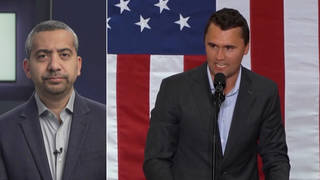
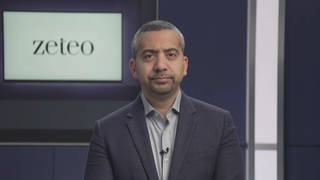
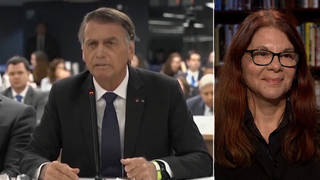
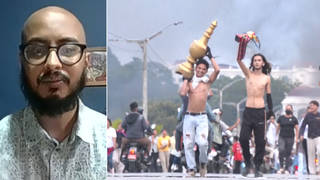





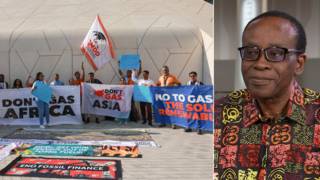
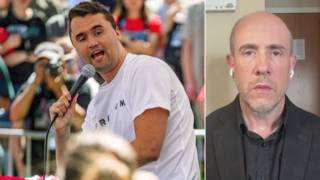
Media Options